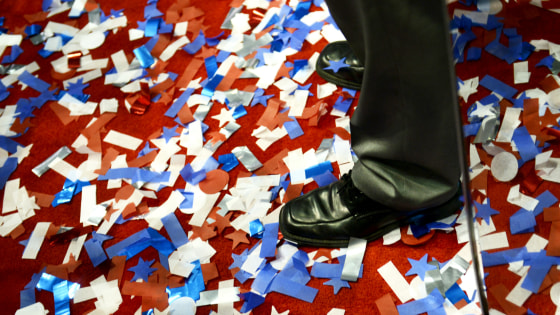Just because the 2016 presidential election is 23 months away doesn't mean it's too early for national polling. But at this stage in the race, all of the data should come with a big "caveat emptor" stamped at the top.
To be sure, the race is just starting to take shape and likely candidates are moving forward with preliminary plans. Jeb Bush is setting up an exploratory committee; Bernie Sanders is in Iowa; Martin O'Malley is hiring staff; Ben Carson is ... doing whatever it is Ben Carson does; etc.
And as this preliminary phase unfolds, there's national polling, too. Here's the latest from
McClatchy/Marist:
If Romney did run, the poll found that he would be supported today by 19 percent of Republicans and Republican independents, followed by Bush with 14 percent. They'd be followed by Gov. Chris Christie of New Jersey and former Gov. Mike Huckabee of Arkansas, each with 9 percent, and physician Ben Carson with 8 percent. The rest of the potential field trails behind in smaller single digits. If Romney didn't run, Bush would lead with 16 percent, followed by Huckabee with 12, Christie with 10 and Carson with 8.
A new Washington Post-ABC News poll of Republicans and Republican-leaning independents released Tuesday shows [Jeb] Bush running first in a GOP field without Mitt Romney, though not leading by a statistically significant margin. He gets 15 percent, compared to 11 percent for both Sen. Rand Paul (R-Ky.) and Rep. Paul Ryan (R-Wis.). In a field with Romney, Romney leads Bush 20-10 percent, with Paul at 9 percent and Ryan at 8 percent.
And what does this tell us about the 2016 race? Not as much as one might hope. Let's take a stroll down memory lane:
* At roughly this point in the
2000 cycle, George W. Bush was in a strong position, but in the Republican primaries, the other top candidates included Elizabeth Dole and Dan Quayle, neither of whom was in the race by the time voting began.
* At roughly this point in the
2004 cycle, John Kerry was in a strong position, but in the Democratic primaries, Joe Lieberman led most national polls and Dick Gephardt was in the top tier. Tom Daschle was also seen as a strong contender.
* At roughly this point in the
2008 cycle, Hillary Clinton was the frontrunner among Democrats, but Al Gore and Bill Richardson were both polling in double digits. Among Republicans, Rudy Giuliani
enjoyed big leads in nearly all national polling.
* At roughly this point in the
2012 cycle, Mitt Romney was fairly well positioned, but Mike Huckabee and Sarah Palin were both at or near the top in national Republican polls. Neither ended up running.
Or put another way, looking at these early polls offered some hints about what was to come, but little else. Many of the candidates who were top-tier contenders at this point in previous cycles either fizzled or decided not to even bother running.
We'll see quite a few polls in the coming months. My advice: take them all with a grain of salt.
